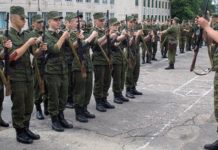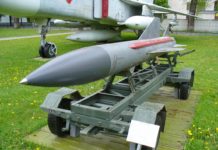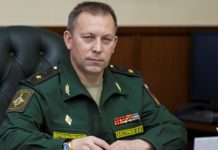Sergei Strokan, Ivan Safronov
Kommersant, August 23, 2016, pp. 1, 6
Russia terminated its use of an Iranian air base for strikes at militants in Syria.
AIR FORCE COOPERATION OF RUSSIA AND IRAN TURNED OUT TO BE SHORT
Russian Airspace Forces could use Iranian air base Hamadan for less than a week. On August 16, it became known that Tehran provided a right to Russia to station airplanes of long-range aviation there and on Sunday afternoon the permit was revoked.
In his interview to Iranian television Defense Minister of Iran Hossein Dehghan announced termination of flights of Russian long-range aviation from Iranian territory for delivery of strikes at militants in Syria. One of the key members of the Iranian government criticized actions of Moscow in public, which was rare for supreme officials of Iran. He expressed an open discontent with the way in which the Russian party covered the news about use of the base. Dehghan announced, “Russians are interested in posing themselves as a super power and in guaranteeing of their role in determination of political future of Syria. Of course, on their part there was a certain share of posing and non-gentlemanly behavior.”
A day before his interview to Iranian television Dehghan had a briefing for Iranian mass media where he explained the motives by which Iran was guided when it provided a base for Russian aviation in detail. Dehghan explained, “This is a military decision made in the framework of our cooperation in combating of IS and other terrorist groups and based on an address of the Syrian government.” He added that approval was obtained from the supreme council of national security of the country. There was not a hint in the words of the Defense Minister of Iran that use of the air base in Hamadan by Russian aviation would end so quickly. At that time the Iranian minister assured representatives of mass media that the Airspace Forces would take off the air base in Hamadan “as much as they need.”
Answering the question about the critique of the agreements with Russia that sounded last week during a debating of this issue in Iranian parliament, the minister stopped any attempts to question these agreements. He remarked, “The parliament has nothing to do with this topic.” The speech of the minister forced many politicians, diplomats and experts to speak about a new stage of military technological cooperation of Moscow and Tehran.
Moscow preferred not to increase the scandal. Ambassador of Russia in Tehran Levan Dzhangaryan confirmed that Russian servicemen quit Hamadan. Along with this, he hinted that the Airspace Forces might return to the air base. Interfax agency quoted Dzhangaryan as saying, “If authorities of our countries consider this necessary and expedient and achieve the relevant agreements, which problems may be there?”
Official representative of the Defense Ministry Igor Konashenkov confined his efforts to a statement that Russian aviation that participation in the operation in Syria performing sorties from Hamadan air base fulfilled the tasks set successfully.
A source in the military command bodies stated that use of Hamadan played “a huge role” for support of the governmental forces in Aleppo, Deir ez-Zor and Idlib provinces but “certain misunderstanding” appeared between the parties at this stage.
The reason was that Russian military wished to use the air base not only as a forward staging post but also as a normal military object with placing of the relevant arsenals there but the Iranian party disagreed with such option. At any rate, General Konashenkov emphasized that further use of the air base “will be done on the basis of mutual agreements on combating of terrorism and depending on the situation in Syria.”
The polled experts consider the decision of the Iranian authorities an action that has confirmed conventionality or situational nature of partnership of Moscow and Tehran in Syria. Lat week, expert of the Moscow Carnegie Center Alexei Malashenko did not rule out that the base in Hamadan might be closed for Russian long-range aviation at any moment. Yesterday, he announced, “Tehran did this even faster than expected. A situation when Moscow claims some global role using cooperation with Tehran as a site for realization of its ambitious is obviously unsuitable for the Iranian authorities. Iran does not wish to be a junior partner of Moscow and hints that it is ready to be only on equal terms with it. Along with this, relations with the West and not with Russia become a priority in the new multi-vector policy of Iran from which sanctions have been lifted.”
Lana Ravandi-Fadai, senior research fellow of the Center for Studying of the Middle East of the Institute of Oriental Studies of the Russian Academy of Sciences, presumes that “pressure on the pat of the US played a huge role in this decision of Iran, Administration of President Barack Obama did a lot to improve relations in Iran and succeeded in this very much.” Yesterday afternoon, the US Department of State announced that it was too early to draw the final conclusions whether the flights from the Iranian base were stopped.
According to Ravandi-Fadai, in the story of the air base in Hamadan Russia found itself in the same position as Iran to which Moscow did not supply air defense missile systems S-300 in the past, “External pressure was exerted on Russia then and we finally preferred observing our interests in relations with the West. Along with this, we also accused the Iranians that they were wrong to make this contract public then. A similar situation happened now and the parties only changed roles.”














